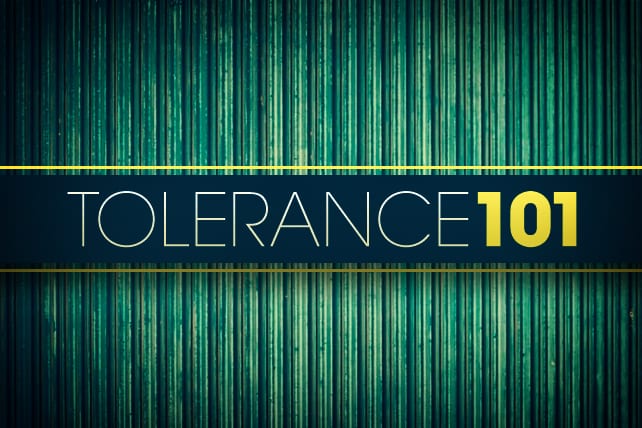Tolerance is not all that it used to be. D.A. Carson sheds light on this reality. Carson notes a shift toward a new kind of tolerance in our culture. It is a shift from accepting the existence of different positions to accepting the different position itself.
Thus, “We move from allowing the free expression of contrary opinions to the acceptance of all opinions; we leap from permitting the articulation of beliefs and claims with which we do not agree to asserting that all beliefs and claims are equally valid.” (D.A. Carson)
This has never been more apparent than with the cultural shaming of HGTV stars Chip and Joanna Gaines or other Christians who have been on the wrong end of this new tolerance: Phil Robertson with A&E, the Benham Brothers with HGTV and Louie Giglio with the White House.
How should Christians respond? In light of the most recent focus on the Gaineses, a few helpful responses have already been posted (for example: Trevin Wax & Owen Strachan). In addition to these responses, an understanding of a biblically-informed tolerance is essential to sustain faithful witness in the face of this new tolerance (or intolerance).
Basics of a Biblically-Informed Tolerance
Tolerance is grounded in recognizing we are all made in the image of God
A biblically-informed tolerance is grounded in creation. Specifically, it is grounded in humanity’s shared creation in the image of God: “So God created man in his own image, in the image of God he created him; male and female he created them” (Genesis 1:27). Thus, our common identity in the image of God requires that we value the life and dignity of all people. And an expression of that dignity is leaving room for “other people to have different beliefs or practices without an attempt to suppress them.”
Even when this privilege is not afforded to Christians in the public sphere, we must not respond in kind. Displaying a biblically-informed tolerance will promote its case for the common good. Requiring the acceptance of another’s belief at the danger of facing suppression actually stifles true tolerance.
Tolerance exists because Christ has not yet returned
To embrace a biblically-informed tolerance is not to deny that right and wrong exist or to jettison biblical truth. Tolerance exists because Christ has not yet returned. As we wait for Christ’s return, tolerance exists. When Christ returns, tolerance will cease to exist as “every knee should bow, in heaven and on earth and under the earth, and every tongue confess that Jesus Christ is Lord, to the glory of God the Father” (Phil. 2:10).
John Piper captures this truth so well:
“Jesus Christ will himself one day bring an end to all tolerance, and he alone will be exalted as the one and only Lord and Savior and Judge of the universe. Therefore, since Jesus Christ alone, the Creator and Lord of history, has the right to wield the tolerance-ending sword, we dare not.”
Tolerance leaves room for gospel conversation
As we await Christ’s return, tolerance should not only exist but it should be encouraged as it provides opportunity for gospel conversation.
Listen to 2 Peter 3:9:
“The Lord is not slow to fulfill his promise as some count slowness, but is patient toward you, not wishing that any should perish, but that all should reach repentance.”
We see how tolerance leaves room for gospel conversation in the ministry of the Apostle Paul when he entered the city of Athens. He was not put off by the plurality of their gods, but rather he was moved to compassion. His compassion was expressed through engaging those around him with the truth of the gospel:
“So Paul, standing in the midst of the Areopagus, said: “Men of Athens, I perceive that in every way you are very religious. For as I passed along and observed the objects of your worship, I found also an altar with this inscription, ‘To the unknown god.’ What therefore you worship as unknown, this I proclaim to you” (Acts 17:22-23).
Paul uses the plurality and tolerance of his culture to engage others with the truth about Jesus Christ. After he unpacks the gospel to his audience (verses 24-31), we see the response of his audience:
“Now when they heard of the resurrection of the dead, some mocked. But others said, ‘We will hear you again about this.’ So Paul went out from their midst. But some men joined him and believed, among whom also were Dionysius the Areopagite and a woman named Damaris and others with them” (Acts 17:32-34).
The response was a mixture of dismissal, interest and reception. This kind of response is what a biblically-informed tolerance looks like. As we share ideas, discuss arguments, challenges others thinking, it allows for God to work in the lives of men and women.
“Hence the distinction: Bad ideas and bad actions are tolerated (in the first sense), reluctantly and with bold articulation of what makes them bad, while the people who hold those bad ideas or perform those bad actions are tolerated (again, in the first sense) without any sense of begrudging reluctance, but in the hope that they will come to repentance and faith.” —D. A. Carson
How to Respond to the New Tolerance
Understanding a biblically-informed tolerance is foundational for engaging our culture with the gospel. Yet, we must also be prepared to respond to the increasingly influential new tolerance. What might this look like? Perhaps we will need to add more suggestions to this list, but here is a start:
- Be prepared for opposition and persecution – Phil. 1:29
- Don’t forsake the authority of the Bible – Acts 20:18-21; 2 Tim. 3:16-17
- Set your hope on Christ and imitate him – 1 Peter 2:21-25
- Keep the gospel as a priority – 1 Corinthians 9:19-23

